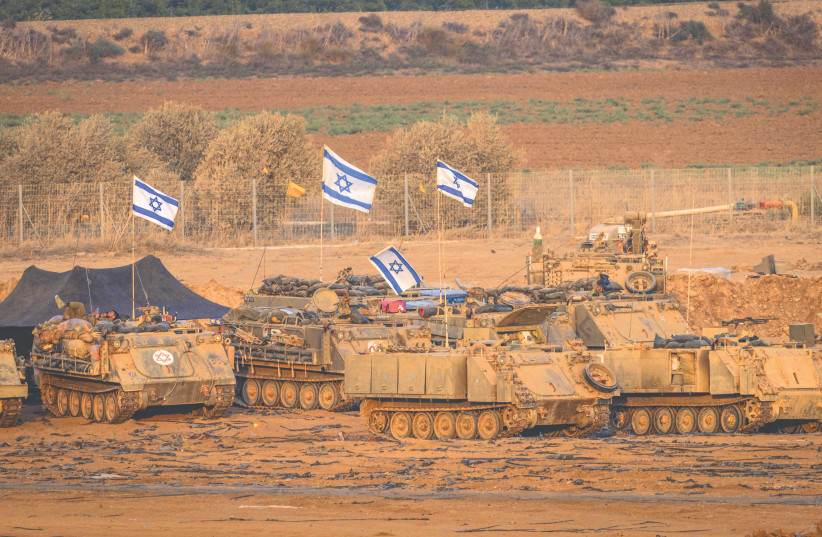The Israel Defense Forces rescued hostage and IDF Private Ori Megidish from Hamas captivity last week.
Megidish was captured on October 7 when Hamas, the US-designated terrorist organization that controls Gaza, perpetrated the largest massacre of Jews since the Holocaust. It including burning alive and beheading some 40 babies, raping hundreds of women, murdering over 1,400 innocents, and kidnapping hundreds of hostages, including Megidish. Most of the (at least) 245 hostages still in captivity are civilians; many are women and elderly, and 30 are children and babies.
In an action reminiscent of America’s targeting of al-Qaeda after 9/11, Israel has responded with a military campaign, the stated goal of which is not only freeing the hostages, but also destroying the Hamas terror organization.
As the IDF operation against Hamas progresses into a fierce ground campaign, a number of international parties, including the United Nations General Assembly, are calling for a “humanitarian ceasefire.” Yet in this discussion, a key point seems to have been overlooked by much of the world, which is that Israelis are human too, and accordingly, such a ceasefire may violate international law.
On Monday last week, former US secretary of state Hillary Clinton pointed out, “People who are calling for a ceasefire now, don’t understand Hamas... It would be such a gift to Hamas because they would spend whatever time [that] there was a ceasefire in effect rebuilding their armaments... to be able to fend off an eventual assault by the Israelis.”
In effect, Clinton is saying that a ceasefire would endanger Israelis, a reality that makes any pause in the IDF’s operations, at best, morally complex.

Yet the return of Megidish changes everything. This stunning operation establishes Israel’s military campaign as an effective means of rescuing the hostages, which means that every minute the IDF delays its military campaign is another minute that innocent Israelis remain in captivity. Under these circumstances, any call for a pause in the IDF’s campaign is, in effect, a call to perpetrate further suffering upon Israelis.
There is nothing humane about that.
In this particular case, not only would a “humanitarian” ceasefire be immoral and cruel to the Israeli captives and their families, but it would also arguably constitute a war crime. Taking hostages is considered a “grave breach” of a number of international laws, including the International Convention Against the Taking of Hostages, and therefore, interfering with the return of such hostages is also a war crime.
Specifically, Article 3 of the Convention requires the “release” and “departure” of hostages, and Article 1 requires that no conditions be placed upon such release. Furthermore, Israel has not only a right, but also an obligation to defend its citizens under Article 2(4) of the UN Charter. Given that the IDF’s military campaign has proven to be a means of securing the “release” and “departure” of hostages as required by international law, any interference with Israel’s legal right to self defense would be a prima facie violation of Article 3. Also, requiring a ceasefire or any other condition in exchange for the release of hostages would be a prima facie violation of Article 1.
In other words, on its face, demands for a ceasefire under these circumstances technically constitute a war crime against the Israeli people.
What about the people of Gaza?
Gaza has no shortage of humanitarian supplies but nonetheless faces a humanitarian crisis, and understanding this paradox is the key to understanding Gaza.
On October 11, Gaza’s only power plant shut down due to lack of fuel even as Hamas fired over 8,000 rockets at Israel, each one powered by…fuel. Satellite images released by Israel (also available on Google Earth) show Hamas’s massive 500,000-liter fuel storage depot, all dedicated exclusively to the Hamas military machine. Hamas has stolen – en masse – food, water, and medical supplies, all confirmed by photos, videos, and intercepted conversations between Hamas operatives. The United Nations confirmed that Hamas robbed its aid facilities, and Israel released a mountain of evidence, including from non-Israeli sources, that Hamas placed a military headquarters inside Gaza’s Shifa Hospital.
In short, Hamas steals almost every resource that the world provides to Gaza and diverts it for military purposes, and – as Clinton – pointed out, this includes the resource of time.
In addition to the ghastly theft of humanitarian aid, Hamas has also committed the “grave breach” of international law defined as the taking of hostages, and the consequences of that breach (including the war itself) impact not only Israelis, but Palestinians as well. Though tragic for Palestinians, the solution to this humanitarian disaster cannot possibly be to inflict additional tragedy upon innocent Israelis or to press Israel to derelict its obligations to its citizens.
Rather, the only truly humane solution is to hold Hamas accountable for its actions, the very actions that created this crisis in the first place. Such accountability must include the immediate release of all Israeli hostages and the unconditional surrender of the entire Hamas terrorist organization to face arrest and prosecution for crimes against humanity. Anything less would constitute a war crime against Israel as well as violating the most fundamental precepts of basic human morality.
The writer is an expert in international law, a lecturer at Reichman and Bar-Ilan Universities in Israel, and CEO of RealityCheck, an NGO dedicated to clarifying global conversations with verifiable data. He lives in Tel Aviv and can be found on Instagram at @danielspeaksup or at www.RealityCheckResearch.org.
